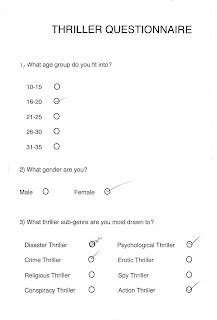
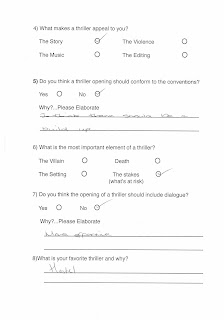
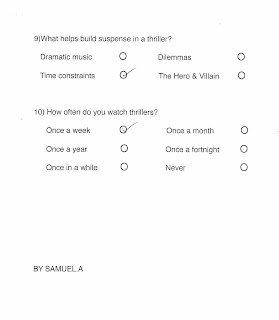
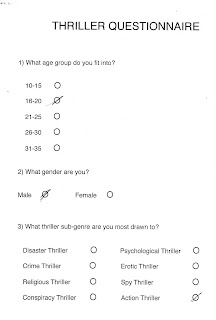
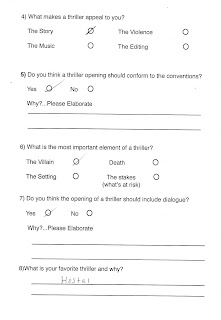
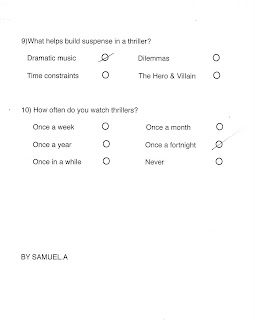
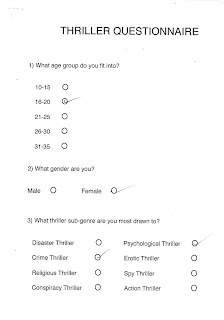
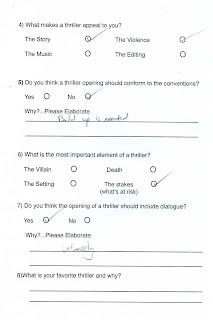
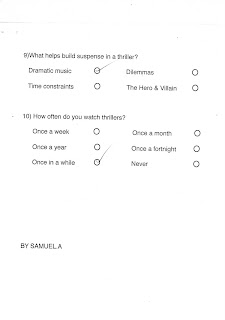
1) In what way does your media product use, develop or challenge forms and conventions of real media products?
Our thriller incorporates generic conventions as the first scene show the actress walking out of a school and going home which is a normal scenario that most people do in their daily life. Our thriller challenges normal conventions because the way the actress dies at the end is quite shocking and unexpected and will leave most people with some suspense. The use of normal conventions does not really indicate what genre it is as from the start of the sequence it just looks like a normal person doing their daily routine and going home. Conventions of a thriller include action, suspense, mystery, vi
olence, conflict, danger, hero/villain, victim. This applies to our thriller as we have our victim, the teenage girl who is followed from college and then murdered in her own home. The suspense and mystery buil
ds throughout and is emphasized through shadowy characters, spying through the door, shadows in the mirror, banging from the loft, etc. We don’t see violence directly but the girl is murdered which implies
that there will be violence within the film. Danger is shown through her being followed, watched and her house being broken into. Also the shadows and darkness suggest danger.
The conventions of a thriller used indicates that it could be a crime thriller as there is mystery, a murder, a victim and a criminal. Also, the murderer breaks into the girls house.
2) How does your media product represent particular social groups?
The only character shown in the opening is a teenage girl who attends college, dre
ssed how you might see as 'normal' in black leggings, leather boots, plain top and cardigan. She is walking along with a phone and listening to her iPod. All stereotypical of a teenage girl. We rated our thriller as a 15, so the target audience for it is above that age, but mainly older like old teens/young
adults. Having a stereotypical 17/18 year old in our film should appeal to this age group. It is aime
d at either a male or female audience.
Conventions of a thriller include action, suspense, mystery, violence, conflict, danger, hero/villain, victim. This applies to our thriller as we have our victim, the teenage girl who is followed from college and then murdered in her own home. The suspense and mystery builds throughout and is emphasized through shadowy characters, spying through the door, shadows in the mirror, banging from the loft, etc. We don’t see violence directly but the girl is murdered which implies that there will be violence within the film. Danger is shown through her being followed, watched and her house being broken into. Also the shadows and darkness suggest danger.
The conventions of a thriller used indicates that it could be a crime thriller as there is mystery, a murder, a victim and a criminal. Also, the murderer breaks into the girls house.
3) How does your media product represent particular social groups?
Our thriller doesn't really explore social groups, as there is only one character introduc
ed and she just appears to be a normal teenage girl on her way home from college. We do give a stereotypical view as to what is perceived as normal, but there isn't much more of an insight to who this girl is.
Gender is also represented in a stereotypical way as the victim is a girl, so she is the helpless, weak character. The murderer isn't shown to the audience so it could be male or female. The characters at the bus stop appear to be male and although they may or may not play a big part in the film, they appear to be a threat and possibly dangerous.
This could make the film appeal to men more as they would prefer to be seen as the dominant sex, and our thriller suggests this.
4) What type of media institution might distribute your media product and why?
We think that the opening sequence of our thriller might attract
distributers that are interested in distributing low budget films that have an interesting story line and that also have the potential to appeal to a large audience as it brings something different to the mainstream market. Also it doesn't use many special effects, an expensive location or highly-payed actors, which ensures a low budget.
A company such as vertigo or working title films might be interested and their history of films have quite similar genres.
We think our thriller could also have the potential to become a tv series as it has got a story line line that can be customized. It is quite similar to daily life for a regular person, until you see behind closed doors.
5)Who would be the audience for your media product?
We think that the thriller would attract a wide range of audiences as the story is
quite intense and just the opening sequence leaves you wanting to know more about what is going to happen next.
The majority of the audience might be males as there a is a attractive female actress starring in the film and we think that would appeal to a male audience rather than a female one. Also you see dominance from male characters over female ones, as the mysterious men at the bus stop appear to be a threat and the girl is a victim.
Another film that we can compare our film to is the hills have eyes but will less gory
scenes and more story line. This film appeals to a smaller audience as it is more gory and specific, probably only for people who are attracted to thrillers or horrors in particular. Whereas, our film contains more every day occurrences and could appeal to those with a weaker stomach as it isn't very graphic. It is more mysterious, as the murders aren't properly shown.
6)How did you attract/address your audience?
We addressed our audience by giving them as little information as possible so the only way to get the full story is to keep watching the thriller. This is why, in the opening, there was no dialogue and therefore very little insight into the film. It did include the first crime and mystery, this would attract a wide range of people as all they would need to be is curious and automatically we have an audience. Also, the idea of male dominance being shown in an already patriarchal society, will attract men to see the film. If not for that reason, then for the attractive female actress.

7) What have you learnt about technologies from the process of constructing the product?

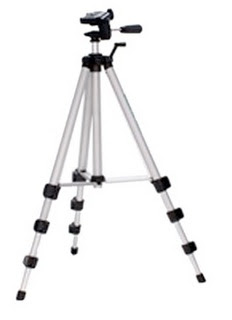
The strengths of using the camera equipment is that it was all quiet simple to use at times as the tripod could conveniently fold up into a compact portable shape that can fit into a case.
The camera was also quiet basic to use as there was a option on the camera to watch a tutorial that showed you how to operate the camera as well as all the buttons and it's various features.
The weakness of using the camera equipment is that sometimes the tripod was stiff and we had to mess around with the screws to get it to respond.

The camera also had some weaknesses as there were some difficulty with the tape as another group had previously used it and didn't clear the tape so it interfered with our footage.
We delt with this by clearing the tape myself before we shot anything new so there wouldn't be no feather issues with the camera or tape.
The equipment enhanced the thriller as the tripod gave us the ability to operate the camera in a 360 motion while in one steady shot.
Final cut pro gave us various options in the ways that we could edit the thriller e.g all the tools for cutting and rendering the footage and the effects such as fade in and fade out.

Garageband was very good at putting the music together but then it was quite difficult importing it to final cut pro and it took us a while until we found a way to convert the music into a mp3 format.
8)Looking back to your preliminary task, what do you feel that you have learnt in the progression from it to the full product?
Our preliminary task helped us by giving an insight into the way we would construct our thriller. Looking back on our preliminary task we think that it has helped us with editing technique. The preliminary task was practice for the full product, and we learnt how to dissolve into another shot, fade-in and fade-out, and other transition effects. Also, it gave us good practice with camera techniques and shots such as the point-of-view shot. We also learnt to ensure we get a good shot of the things we plan to include, even if it has to be shot repeatedly. As when we come to edit and don't have a good shot of what we need, it could either effect our grade or waste or time as we would have to then film more. We have experimented with lots of new programs along the way and used them to attract an audience and create conventions the can be recognized. The preliminary task taught us how important the steps of production before and after are as well. For example the plan and an analysis, without these we would have struggled in the beginning and then failed to improve.




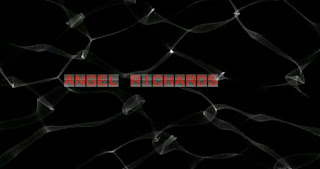
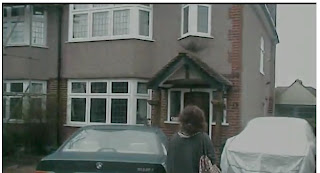
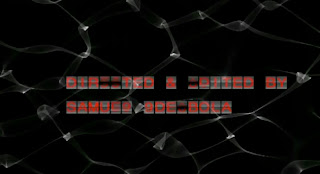
Transitions
The transitions from shot to shot were very simple as final cut pro had a wide range of dissolve and fade effects that we could use. We experimented with lots out different ones for our preliminary and used the appropriate ones for our thriller such as dissolve as it created an eery, mysterious effect.
Credits
The credits were created on motion 3 on the apple mac’s and it was good as it gave us a lot of features that we could use. We tried to pick colors and fonts to compliment our genre and story-line. Red and black was perfect because it suggests crime, danger, murder and the darkness suggests mystery as 'being in the dark' about something means you don't know or aren't aware of it. The black background effect, 'Caustics', appeared eery and ghostly, like the scarf at the end, again representing death. Also, because it is delicate and dainty, it suggests and emphasizes the innocence of the victim.
Non-diagetic sounds
We customised an original track that had a section in it that we thought would be perfect for the thriller. The instrument we used to create our own melody was 'Grand Piano'. This was on top of the original track form GarageBand, 'Exotic Longing'. This all had to be converted to mp3 in order to imported to final cut pro and used in our thriller.
Final Cut Pro
The shots were cut down and edited together using this program, including the transitions. Our thriller had to be converted from final cut pro into Quicktime in order to be put on Youtube and on our blog.


Camera Shot/Angle/Movement
The camera shots in the opening sequence of Hostel 2 are very weird as all we can see is someone emptying someone’s bag and it feels you with suspicion onto their recent activities.
The shots are also all low angle shots as all we see is the hand and also the movement of the camera varies at it is mostly still and focusing on one object.
There was also a first person view when the character is looking at the wallet
Sound
The sound in Hostel 2 is very strange as all the way through the opening sequence there is the sound of raindrops in the background and also other very realistic sounds such as when the character unzipped the bag, puts the objects on the table and also when the fire is burning.
Editing
The editing in Hostel 2 is very simple as most of the shots follow on after the other e.g. the objects he removes from the bag as the camera cuts from the objects on the table to the wallet in his hand.
Mise en Scene
The mise en scene in Hostel 2 is basically just based around the series of objects that the character removes from the bag such as a bottle containing an unknown liquid, a watch, other pieces of jewellery and a wallet containing someone’s personal things such as their id, credit cards and money.
Characters
There is a character in opening sequence but we never get to see his face so we can’t establish if he is the main character or not.
There are also other clues to other clues to other characters in the movie such as the person on the id picture in the wallet.
Locations
The location of Hostel 2 seems to be a room with a fair amount of lighting.
Although the ID card we see says California it is quite obvious that the location isn’t the same as the character seems to be wearing quite old fashioned dirty clothes.
Which suggest that the character is poor and probably stole the bag from a tourist visiting a foreign country.
Narrative/Plot
The storyline of Hostel 2 isn’t so clear but from what we see the character doing we can gather that he obviously stole the bag of someone as the Identification Card doesn’t belong to him and also that they are probably going to come and look for it.
Themes
The themes of Hostel 2 are death and mystery as the character that we see on the screen may have just killed the person that owns the bag.
Visual Style
The visual style used in Hostel 2 is very specific as the opening sequence start with a character opening a bag and as he removes the objects from the bag, the camera also positions in a way that we can see what he his doing.
Genre
Hostel 2 is a thriller/horror as it has some of the conventions that a film containing death and graphic scene has.
The fact the he burnt the picture at the end of the opening sequence the death of that character.